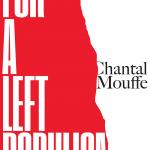For a Left Populism: A New Strategy for Democratic Socialism

For a Left Populism
Chantal Mouffe
Verso
ISBN: 9781786637550
A spectre is haunting Europe. It is slowly emerging from the rubble of the great recession. Once proud democracies gaze passively at its approach. Some are divided. Others, without majorities, can barely govern. The prospect of an election strikes fear into the heart of those once dominant liberals.
Democracy, we are told, and decency too have a new enemy. It is no longer stalking in the shadows. It has no need to shake off the stigma of extremism. It now announces itself openly and brazenly.
After Orban and Salvini, Corbyn and Tsipras, the fears of the liberal centre have been confirmed. The populist moment has arrived.
Across Europe a narrative of the populist threat to democracy is becoming dominant. Whether of the left or right, its illiberalism is apparently undermining the very fabric of society.
While the virus infected just the periphery could be contained, through brute force in Greece or amputation in Britain. But now with Italy, it has entered the very bloodstream of the union.
Defeating populism, particularly in the forthcoming European Parliament elections, is liberalism’s most urgent task.
Punchy tract
Not so, argues political theorist Chantel Mouffe in her short but punchy tract, For A Left Populism. With an economy of words that is both refreshing and rewarding, Mouffe challenges the political centre’s assault on populism.
More than that, she reverses their claims by placing liberalism’s undermining of democracy at the centre of our current political crisis. In response she argues that a left-wing democratic populism is both necessary and urgent.
For A Left Populism builds on three decades of writing on the limits of liberalism and the need for a new strategy for democratic socialism. Since the publication of the groundbreaking Hegemony and Socialist Strategy in 1986, co-authored with Ernesto Laclau, Mouffe has been articulating a political project that rejects social democracy’s capitulation to liberalism while at the same time refusing to retreat into Leninist nostalgia. Her latest book serves as a timely reminder of and a useful introduction to that work.
The cause of the populist moment, argues Mouffe, is the triumph of liberalism over democracy. Postwar welfare capitalism struck an imperfect balance between the needs of capital and labour. Democracy acted as a constraint on unbridled liberalism. That balance was broken with the rise of neoliberalism, which after 30 years, has replaced contested democracy with technocratic rule.
Mouffe agrees with Crouch and Ranciere that we have entered a post-democratic era. Rising socio-economic inequality, coupled with the depoliticising of politics, has undermined, possibly fatally, the traditional social and Christian democratic movements. In the fragmentation that has ensued populism has re-emerged.
For Mouffe a democratic pluralist populism, arguing against the racism and xenophobia of the populist right and against the technocratic liberalism of the political centre, is the best antidote to our current crisis.
Hegemonic project
Following Corbyn’s Labour and Iglesias’s Podemos, Mouffe argues that it is time for the left to articulate a new hegemonic project, bringing together all of the local popular resistances to the post-democratic neoliberal order. This is best done, she argues, by redefining the people in opposition to the elites and oligarchs and by reclaiming antagonism as the defining logic of a truly democratic politics.
In place of consensus she argues for partisanship. Instead of the atomised consuming subject of liberalism she calls for the construction of a popular democratic movement of the people.
Unfortunately Mouffe avoids two obvious questions that even a sympathetic reader is bound to ask.
The left-wing populist project that was Syriza in Greece was crushed by the combined forces of the European Council and Central Bank. Meanwhile, the advance of Podemos in Spain and Momentum in Britain appears to have stalled. Elsewhere the populist left is struggling to make any significant breakthrough. In some states, including Ireland, the liberal centre is regaining ground. Yet Mouffe says nothing of all of this.
The book is also silent on the question of the European Union, all the stranger given that it was written against the backdrop of Brexit by a writer living in England. What does a left populism have to say about the political and institutional constraint that is the EU. Should Mouffe’s silence be taken as a tacit endorsement of exit?
For A Left Populism would have been a stronger book if it had grappled with these political realities, even if its author offered no definitive resolutions. Nonetheless it is an important contribution to the strategic debate for those of us committed to political and socio-economic alternatives based on principles of democracy, equality and social justice.
Eoin Ó Broin is a Sinn Féin TD and writer.
